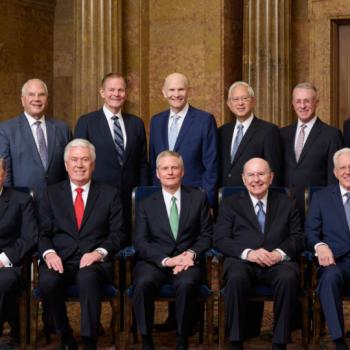
Paul Johnson well summarizes the catastrophic changes in the fortunes of world Jewry:
In the short-term perspective of the second century AD, the Jews appeared to have been a powerful national and religious group which had courted ruin, and achieved it. During most of the first century, the Jews not only constituted a tenth of the empire, and a much higher proportion in certain big cities, but were expanding. They had the transcendent new idea of the age: ethical monotheism. They were almost all literate. They had the only welfare system that existed. They made converts in all social groups, including the highest. One or more of the Flavian emperors might easily have become a Jew, just as Constantine was to become a Christian 250 years later. Josephus was entitled to boast: “There is not one city, Greek or barbarian, nor a single nation where the custom of the seventh day, on which we rest from all work, and the fasts and the lighting of the candles, are not observed . . . and as God permeates the universe, so the Law has found its way into the hearts of all men.” A century later, the whole process had been reversed. Jerusalem was no longer a Jewish city at all. Alexandria, once 40 percent Jewish, lost its Jewish voice completely. The huge casualty figures cited by such authors as Josephus, Tacitus and Dio for the two revolts (Tacitus said 1,197,000 Jews were killed or sold as slaves in the 66-70 struggle alone) may be exaggerated but it is clear that the Jewish population of Palestine fell rapidly at this time. In the diaspora, the expanding Christian communities not only purloined the best Jewish theological and social ideas, and so the role of “light to the gentiles,” but made increasing inroads into the Jewish masses themselves, diaspora Jews forming one of the chief sources of Christian converts.[1]
It would have seemed, with the temple gone, with all the old priesthood organizations destroyed and the rituals now impossible to perform, with the people scattered and leaderless, that Judaism was finished. Other religions, after all, had vanished from the face of the earth before. Nobody worshipped Babylonian Marduk any more. The gods of ancient Egypt were dead or dying. So, too, were the gods of ancient Greece. And, truly, this was a traumatic period. A vacuum appeared at the center of Judaism. There can be no doubt that Jews everywhere were depressed and demoralized. The zeal of the first revolt and the messianic fervor of Bar Kokhba’s rebellion were succeeded by doubt and despair. Gloom, as we can well understand, was pervasive, and the next five centuries would be a time of agonized adjustment to the new and harsh reality of exile. But Judaism was different. It survived.
One of the forms in which it survived is scarcely noticed by us today, so familiar are we with it. In the midst of all of the political agitation and instability, amid the wars and the massacres and the exiles, a movement had arisen that would prove far more important than any of the political revolutionaries and their plots. A man by the name of Jesus of Nazareth had taught for a few years in Palestine and had then been put to death by the Romans. This was done at the request of the Jewish leadership, ostensibly because they feared that he was preparing yet another rebellion against Rome, but more precisely because his teachings undercut their own authority among their people. The trouble, of course, was that Jesus didn’t stay dead. His followers, energized by their conviction of his triumph over the grave as well as by the outpouring of the Holy Ghost upon them, began to spread his teachings with more vigor than ever. The worst fear of the chief priests and Pharisees had come horribly true: Please, they had begged Pilate, please assign a guard to Jesus’ tomb, “lest his disciples come by night, and steal him away, and say unto the people, He is risen from the dead: so the last error shall be worse than the first.”[2]
New believers flocked to the standard of Christianity, including a diaspora Jew by the name of Saul of Tarsus who was transformed from persecutor to convert by a direct appearance of the risen Christ. Saul’s family was originally from Galilee, and although he had been raised in Cilicia, in what is today Turkey, he had returned to Palestine to study under the great rabbi Gamaliel the Elder. Convinced by his vision of the divinity of Christ, Saul devoted his life to preaching the gospel to the Jews of the diaspora and even to the Gentiles. It was a mission for which he was perfectly suited. He was fully Jewish. As he himself said, he was “circumcised the eighth day, of the stock of Israel, of the tribe of Benjamin, an Hebrew of the Hebrews; as touching the law, a Pharisee.”[3] Yet he also had a good secular education, including a command of Greek and of gentile culture. He could quote their own poets to the Athenians on Mars Hill, trying to convince them to listen to his message.[4] Furthermore, Saul held Roman citizenship, something that was comparatively rare out in the provinces, and he used it and its privileges on more than one occasion to further his mission.[5] In fact, he soon began to go by his Roman name, Paul, rather than by his Jewish name.
[1] P. Johnson, History of the Jews, 147-48.
[2] Matthew 27:64.
[3] Philippians 3:5.
[4] Acts 17:28 features references to at least two Greek philosopher-poets. Epimenides of Cnossos, who wrote in the sixth century B.C., used language very much like Paul’s “in him we live, and move, and exist.” The statement “We are all his children” is a direct quotation from the Phainomena of Aratus, a third-century pagan poet from Saul’s own native Cilicia.
[5] In Acts 22:24-30, he used his citizenship to avoid a scourging. It may also have helped him to escape a lynch mob, according to Acts 23:27. Faithful to the command given him at Acts 23:11 to go and preach the gospel at Rome, Paul managed, by appealing to Caesar (Acts 25:9-12), to get the Roman government to pay his mission expenses. It is a bit reminiscent of Parley P. Pratt’s experience while a missionary in western Ohio. He was arrested on a baseless charge and hauled off to court, where he preached and sang to the judge. Such behavior did not amuse the court officials, and Brother Pratt spent the night in jail. However, on the next morning he was in the mood to continue his missionary labors and had no interest in further imprisonment. So, at a certain point while standing in the public square, he turned to his jailor, a Mr. Peabody, and said, among other things, “You have given me an opportunity to preach, sing, and have also entertained me with lodging and breakfast. I must now go on my journey. . . . I thank you for all your kindness—good day, sir.” At which, he escaped by running into the nearby forest, which is a hilarious story in its own right. See Autobiography of Parley Parker Pratt, edited by Parley P. Pratt, Jr., 6th ed. (Salt Lake City: Deseret Book, 1966), 48-51. Amusingly, an annual Parley P. Pratt Freedom Run is now held: https://www.facebook.com/pppfreedomrun/.












